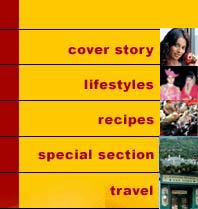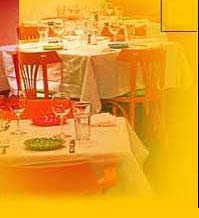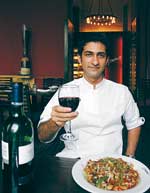


|
Eating Out...
|
|
I HAVE bad news for the foodies of suburban Bombay and other cities. Moshe Shek, that talented Jewish chef and restaurateur, has just decided that he does not want to expand any more. Whatever he is doing, and he is doing quite a bit of business and then some more, is going to remain in South Bombay only. He has turned down the offer to start a restaurant in an old bungalow at Bandra. �There are two sides to my life: the business side said �do it; the other side said, don�t � it�s not right! I would not be happy shuttling between places like a mad man. Then my restaurants would be run by managers and sub-managers and chefs and sub-chefs, and I would be getting further away from everything I like doing,� Moshe said, explaining his decision. He is happy with running his 64-cover restaurant Moshe�s in Cuffe Parade, plus another restaurant named after himself in Bombay Gym: and three cafes; in Gold�s Gym at Napean Sea Road and Crossroads at Tardeo, and the last one which is coming up at Fabindia store in Kalaghoda. The cafes are places he has rented out or are joint ventures on a profit-sharing basis, and out of them, Moshe sells everything from fresh juices and smoothies to sandwiches made on site and soups; and from pastries and pies to teas and coffees.
�I have just made the decision not to expand,� he told me over lunch. It sounds funny, but I was eating with Moshe at Moshe�s, a bottle of South African red wine lay open on the table between us. He is only a wine drinker. So am I. �But I am not a guru on wine,� Moshe admitted as he poured out two glasses of Two Oceans� Pinotage. His wine list described the Pinotage as being a light and easy drinking wine, mildly oaked. I am not a wine connoisseur myself, only an aficionado, but I recognise a good wine when I am drinking one. This one was. I studied his wine list while Moshe moodily swirled the dark red liquid around his glass. Very basic. A Merlot from Michel Laroche of France, another one from Robert Mondavi of California, two Chiantis from Italy, a Riesling from Germany, a Marsanne from Australia, two Chardonnays � from Australia and California, a couple of Zinfandels, almost the complete range of Sula from Nashik, and Grovers� La Reserva. I was impressed by his selection. �Like most busy restaurants, I don�t have a huge wine list,� he said. �This is not a lounge, I want people to eat, enjoy the wine, have dessert, and go. Only in fine dining restaurants will you have wine course by course. Wine is so basic. People are inhibited � do we have it or not! I want to break that. So I have kept my wine
list simple, the wines are accessible, my prices are lowest in the city. I have
only those wines which I drink myself and understand. Nothing complex, no heavy oakey flavours, nothing which is extra dry, or sweet, no Port. These are general favourites from all over the world. And I am not intending to be clever and pair them with the food. I want it to be casual.�
Our meal was casual enough. In keeping with his Jewish faith, he had ordered me a Hameem, which is a traditional Sabbath pot roast of chicken, rice, potatoes and spices, and which was finished in the oven and accompanied with lime and crusty bread. He was having a Fussilli and Mozzarella Salad. And we shared a Patalican Kebab, which Moshe said was Turkish, made of ground lamb and aubergine, spiced with coriander, paprika, mint and garlic. The dessert, I already knew, was going to be Moist Coffee and Chocolate Pie served warm and with vanilla ice-cream. I asked him how he would describe his menu. �It is purely Mediterranean food,� Moshe replied. �It is not fusion, there is no mixing, and it has nothing to do with nouvelle style. My flavours are from around the world, but I keep them as they are, I don�t modify the tastes. Some dishes are my own. Like the Chargrilled Rawas. It doesn�t belong anywhere. I make it with capers, lime and coriander, and serve it with oven roasted zucchini, baby potatoes, shallots and peppers. I have kept the Mediterranean flavour. We call ourselves a casual restaurant serving very fine food.�
The legend on his menu said that on his travels, Moshe always tasted a wonderfully varied selection of food, ranging from elegant and refreshing to restorative and warming � many of which have become the mainstay of his menu repertoire. �Each dish is a snapshot of a region revealing something of its culture and resources,� Moshe had written. His food is cooked very simply. It is the marinades that go into making them that are special. �Like all simple ingredients that are not interfered with too much, it is important that they are of the best quality,� he said. �You must get that battle done, running a successful restaurant has got very little to do with the food. I don�t overdo my food, there is no extra spice, just three or four sauces, emulsions, a swirl here, a trickle there. If the base is good and tasty � wow, your food is good! But I keep it simple, I really don�t do much.�
Moshe�s, which is at Cuffe Parade in South Bombay, is just two years and eight months old. He started it on January 1, 2004. Apart from hotelier Ravi Ghai who named his night club and disco RGs after himself, and cricketer Sachin Tendulkar who calls his restaurants Tendulkar�s and Sachin�s, there is nobody I know of in Bombay whose eatery or bar bears his own name and signature. Moshe had genuine reason for doing this. He was just branching off on his own after a couple of bad business decisions, and how best to tell people who liked his food where he was going than by naming his new restaurant after himself! I applaud the decision. It shows style, it smacks of class, and it also reveals Moshe�s pride and confidence in his product � which is largely himself. But the place where Moshe�s was coming up, Minoo Manor on the main Cuffe Parade Road,
was considered a jinxed property. �Numerous other restaurants, businesses, had tried to run from here,� Moshe admitted. �They didn�t last more than six or eight months. Sanjay Narang�s Dosa Diner, which was here before me, survived for nine months.� I am happy to say that Moshe broke the jinx. And No. 7 Minoo Manor has never looked happier. The restaurant is a cosy little place, 41 covers inside the air-conditioned room with wooden flooring, glass windows, wooden chairs and tables, brickwork, Star of David candlestands; plus a deli section that sells the most amazing cakes, desserts, cookies, sandwiches and pies that side of town, and a bread shelf that gets filled with 25 varieties of bread that Moshe bakes at his bakery, Moshe Central in Worli. There are marble tables and wrought iron chairs in the courtyard outside that seat 23, around which bloom flowering plants and in the centre of which is growing, I think, a handsome rubber tree! But it was not like this when he took over. �It didn�t even look like this � nothing close to it,� Moshe said. He got a good architect who readied the place in 45 days by working round the clock while Moshe himself prepared the menu.
Since this is not a typical eating out piece where I describe the food and the chef shares the recipe, I will tell you how Moshe goes about planning his menus. Actually, I asked him about recipes to his signature dishes, and Moshe looked at me kindly while saying, �It is bad manners to ask a chef for his recipes. He won�t tell you. These are his creations. It is like asking Coke for the formula to their cola! This is a business policy.� So I left it at that. But he has no problem himself in recreating recipes of the food he has had on all his travels. His menus are based on his travels. And wherever he dines, Moshe does not need to go into the kitchens and introduce himself, he knows what�s gone in the dish just by the taste. �Each trip I make, the journey influences my next menu. I have just got back from a trip to Scotland and England, where I spent time in the Highlands and in Dorset. I did an artisanal breadmakers� course on this trip. That is learning to bake bread in the rustic, old-fashioned way. The place where I learned, an old watermill used to grind the flour, if the water ran out � the mill would stop. I also did a cheese course in Scotland with this Scottish family which lives in a place called Stormferry that is in the middle of nowhere! They are a couple, they milk their own cows and make cheese from that milk, I am glad of the knowledge I got because I am sick of the cheese we get here. Next I will do a longer, proper course on cheese making. I have already started introducing the breads that I learned to make in Scotland.�
Moshe is obsessed with the idea of being self-sufficient. �I want to be able to one day make everything that I use in my cooking, the idea being not to buy from outside, so that I know what I am selling. A week ago, we made our own ketchup here! It costs me Rs. 75 a kilo. Outside, I could get ketchup for Rs. 49. But look, my own ketchup has
no starch, no potato, no lecitin, no antioxidants, no additives,
no emulsifiers, no stabilisers, no preservatives, no colour, it is pure tomato with natural cider vinegar.� His customers speak highly of Moshe�s quality and it is details like these that make all the difference between a successful restaurant and an also-ran. He is also strong on using only what is seasonal. And he is finicky about standards. His seafood contractors know, only if something is excellent should they bring it to the door. He has good suppliers, the best in the business in Bombay, because Moshe buys a lot and he pays well. Only premium meats, fresh fish, the best quality vegetables. Everything is local, nothing imported, the meat is from the Bombay market, the Rawas and Pomfret from the coast off Gujarat, the Prawns from fisheries around the city, the Trout comes from Manali, the vegetables from all over Maharashtra. He is not into organic foods. �Why ape the West? Our farmers can barely survive. I say treat the farmers well first, that�s more important than organic vegetables, and besides � I don�t know if anything can�t be bought in this country, how do I know it is genuinely organic, but if some international body were to come and set up an organic farm here � I�d be happy.�
His main menu has changed only once in these two years and eight months, but Moshe�s has an add-on menu that he introduces every fortnight, that is full of seasonal changes. �The chunk of my business is regulars,� he said, �and they are keen on ordering the next thing. They are always asking, �What�s new?� The add-on menu is for them.� It is true. The restaurant was filling up for lunch quickly with his regulars. I looked at the clientele. A mixed bag, and a good mix of ages, there was a group of 15-year-olds who had been dropped to Moshe�s by their parents and were having lunch by themselves and some grandparent types who were brought in and were unsure of what to order next! It is amazing, in all this time, Moshe has not repeated one item on any of his fortnightly seasonal menus. �We can do so much more,� he said. �Desserts, for example, we do three new ones every 10-12 days. That keeps us away from the guys who copy us blindly. They may copy, but how much, they can�t keep up the pace.�
I asked him what kept him going. Moshe Shek pondered. �It�s hard to say,� he let out finally, �but I want to provide good food without the snob value. Everybody knows where food comes from. It is our most basic need to survive. I want to do fine food, but won�t put it on a platform, I won�t give it high-added terms to amuse.� As he drained his glass of wine, I asked, �What would you be if not Moshe � the restaurateur and chef?� And he replied, �A postman, because I figured he is always making people happy by bringing them mail.�
|

Home Page
About the mag
Subscribe
Advertise
Contact Us
 Anywhere in Europe, Moshe Shek might have got a Michelin star for his restaurant, in Bombay� he gets more and more customers, says MARK MANUEL who had lunch with the mercurial restaurateur and chef.
Anywhere in Europe, Moshe Shek might have got a Michelin star for his restaurant, in Bombay� he gets more and more customers, says MARK MANUEL who had lunch with the mercurial restaurateur and chef.